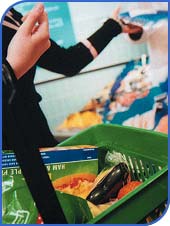In February, we published on the Safeway website our first comprehensive report on how we are meeting our corporate social responsibilities. Shareholders who wish to read the detail may do so on www.safeway.co.uk
What is now commonly known as CSR focuses on how we incorporate the concerns of our stakeholders into “business as usual”. Our stakeholders include our shareholders, customers, staff, suppliers, the farming community, the media, special interest groups, local authorities and, of course, the Government itself. All have their own, sometimes conflicting demands and expectations which we have to meet. Equally important is the need to demonstrate how we are meeting them or planning to do so.
In February, we published on the Safeway website our first comprehensive report on how we are meeting our corporate social responsibilities. Shareholders who wish to read the detail may easily do so on www.safeway.co.uk
The key developments, however, include:
Social and environmental management systems
We have now formed a CSR steering group to drive our strategy forward. This is chaired by Supply Director Lawrence Christensen. Last year, we commissioned management consultants to conduct an internal review of our management systems and are now implementing their recommendations.
In addition, we are pursuing the following priorities for the current year:
- We are continuing to roll out the ISO 14001 certification programme at our
regional distribution centres. This certificate shows that the site has a formal
environmental management system in place and is committed to continuous improvement.
- We have established key action plans for health and safety which focus on
risk reduction, training and support needs as well as monitoring and review.
- We are pushing forward the various initiatives we have launched in recent
years to reduce our impact on the environment. For example, we are aiming to increase
the number of Compressed Natural Gas vehicles in our fleet from 25 to 80, by working
closely with our gas supplier and the Government. We are also exploring opportunities
to extend our rail operations in Scotland and move products between our Coventry
depot and our bonded warehouse at Mossend, near Glasgow.
- We will continue to drive forward with our Investors In People programme.
This sets a level of good practice for improving the performance of a company
through the people it employs.
- We will continue to implement the Ethical Trading Initiative (ETI) Base Code
to improve working conditions and employees’ rights in relevant countries.
The ETI is an alliance of companies, non-governmental organisations and trade
unions to promote better conditions for those who work in the supply chain in
developing countries. Its work is complemented by the Fair Trade Foundation, which
encourages the sale of products grown and produced under ethical conditions. Safeway
sells a range of Fair Trade products and is looking for opportunities to extend
it where there is sufficient customer demand. A recent example is the replacement
of our organic banana range by Fair Trade organic bananas sourced exclusively
from a growers’ cooperative in Ecuador. The Local Authority Pension Fund
Forum has said that Safeway is one of the only two retailers to meet all internationally
recognised labour standards.
- We will continue to engage in best practice initiatives with other organisations. For example, we have joined Sustainable Arable Farming for an Improved Environment (SAFFIE) to promote farmland biodiversity and reduce the impact of intensive agriculture on the countryside. We are also supporting a four-year research programme launched by Linking Environment and Farming (LEAF) to develop even more exacting standards of food production which build on those of the Assured Produce Scheme (APS).
We have been setting ourselves environmental targets, for example on energy usage, recycling and wastage, every year since 1996. We will extend this practice to include broader CSR objectives and regularly report on our progress.
Shareholder engagement
A review of our current stakeholder engagement processes is a priority for the CSR Steering Group.
One example of our approach to stakeholder engagement is the ongoing development of a constructive dialogue with farmers and their representatives, resulting in practical steps to help them adapt to change and manage adversity. As a result of the Foot and Mouth crisis, for example, we agreed with our suppliers that Welsh sheep farmers would be paid within 48 hours of delivering their animals to the abattoir. We said that we would maintain this commitment for six months until the end of January 2002 and we did so. We have also funded the provision of lap-top computers to young farmers’ clubs in Devon and Wales to help them improve their day-to-day management skills.
CSR reporting
As part of our commitment to greater transparency we will continue to improve the quality of information we produce to support our CSR strategy. We will provide regular updates through our website on our performance against targets.
We are already included in a number of indices which demonstrate our commitment to CSR improvements, including:
Dow Jones Sustainability Index (DJSI World)
Established in 1999, this index is the first one to track the share prices of sustainability-driven companies worldwide. Safeway has been accepted into the DJSI World 2002 index.
FTSE4Good UK index
Safeway became a constituent of this index in March 2002.
SERM (Safety and Environmental Risk Management Agency Ltd)
This is an independent company set up to provide companies and investors with a strategic benchmarking assessment of their safety, environmental and social risk exposure in hard financial terms. SERM has given Safeway an AA+ rating (maximum possible score AAA+) which is the highest in our industry.
Next steps
We have now completed phase one of our CSR strategy, which was to take stock of where we are and identify areas for improvement. In phase two, which will take up to at least 12 months, we will deliver the aspirations outlined above, again with external assistance. We will also define our longer-term goals more rigorously, develop a more formalised environmental management system across the whole of our business and make a more detailed assessment of how we engage with all our stakeholders.
| © Copyright 2002. Safeway plc. | Top | Previous | Next |

